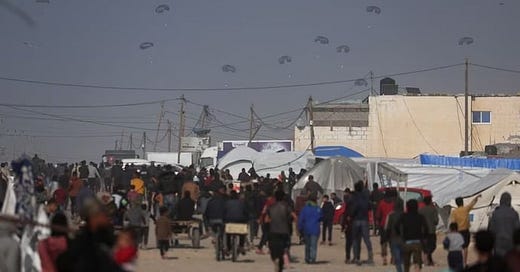Biden Orders Military Airdrop of Aid to the Beleaguered Gaza
Manna from Heavens or Token Gesture to Assuage Pro-Palestine Emotions Domestically?
Manna from Heavens or Token Gesture to Assuage Pro-Palestine Emotions Domestically?
In a significant move that underscores the complexity of international diplomacy and the acute humanitarian needs in conflict zones, President Joe Biden has authorised the commencement of military airdrops of aid into Gaza. This decision follows a distressing encounter that resulted in over 100 fatalities, bringing to the fore the dire situation faced by Palestinians in the region. "Aid flowing to Gaza is nowhere nearly enough," Biden articulated, underscoring the urgent necessity to amplify relief efforts. "Innocent lives are on the line, and children's lives are on the line. We won't stand by until we get more aid in there."
A Response to Crisis
The announcement from the U.S. President comes in the aftermath of a devastating day where over 100 Palestinians lost their lives during a turbulent confrontation with Israeli troops. This incident, which saw at least 115 Palestinians killed and more than 750 injured, has prompted a reevaluation of how aid is delivered to the beleaguered territory. With witnesses recounting scenes of chaos as individuals scrambled to retrieve goods from an aid convoy, the humanitarian crisis in Gaza has never been more palpable.
The Strategy of Airdrops
Opting for airdrops as a method to deliver aid represents a nuanced approach to addressing the immediate needs of Gaza's populace while navigating the logistical challenges inherent in such operations. "In the coming days, we’re going to join with our friends in Jordan and others who are providing airdrops of additional food and supplies," Biden announced, signalling a concerted effort to bolster the flow of humanitarian assistance into Gaza. This initiative, while indicative of the critical situation, also highlights the complications involved in ensuring aid reaches those most in need.
International Collaboration and Domestic Expectations
The shift towards airdrop operations has not only illustrated the international community's role in alleviating the suffering of Palestinians but also reflected the domestic pressures faced by the Biden administration. With countries like Egypt, France, Jordan, Qatar, and the United Arab Emirates already employing airdrops to deliver aid, the U.S.'s engagement through similar means is a testament to the collective endeavour to support Gaza amidst ongoing conflict.
Moreover, the domestic landscape, particularly within Biden's Democratic Party, has seen growing calls for a more assertive stance on Palestinian welfare, further influencing the administration's decision-making process.
Toward a Cautiously Optimistic Future
As efforts continue to expand the avenues for aid delivery and explore the possibility of a marine corridor, there's a cautious optimism about the potential for alleviating the humanitarian crisis in Gaza. The collaboration between the U.S. and its allies, alongside the pursuit of diplomatic solutions to the broader conflict, suggests a pathway towards mitigating the immediate suffering and, ultimately, securing a more stable and peaceful future for the region.
In summary, while the airdrops can be seen as a crucial, immediate response to a dire situation, the long-term resolution of the conflict and the sustained well-being of Gaza's residents remain complex challenges that require unwavering commitment and innovative solutions from the global community.






